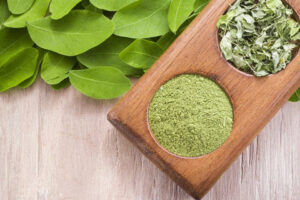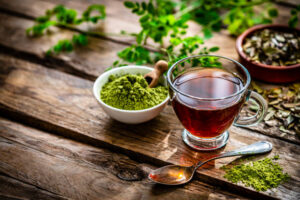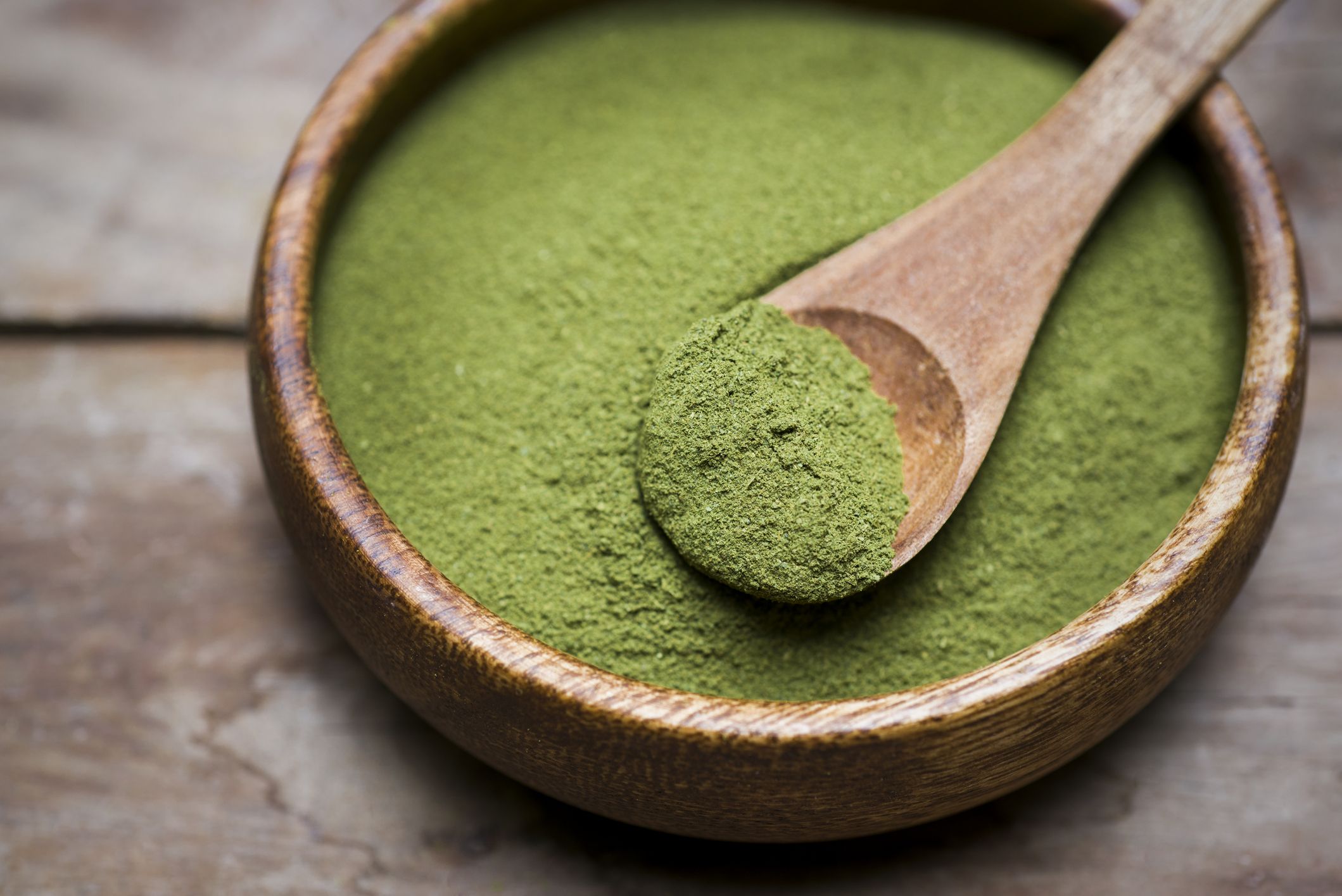
Moringa Powder
Moringa powder, derived from the leaves of the Moringa oleifera tree, is a potent natural supplement that has gained immense popularity due to its exceptional health benefits. Let’s delve deeper into this remarkable superfood and explore how it can contribute to achieving radiant health.
Table of Contents
Introduction to Moringa Powder
What is Moringa Powder?
Moringa powder is a nutrient-rich substance derived from the leaves of the Moringa oleifera tree, which is native to regions of Africa and Asia. The leaves are carefully harvested, dried, and finely ground to create a potent supplement. This powder is a nutritional powerhouse, containing a wealth of essential vitamins, including vitamin A, vitamin C, calcium, potassium, and iron. Additionally, it’s packed with antioxidants like quercetin, chlorogenic acid, and beta-carotene.
Its impressive nutritional profile contributes to various potential health benefits. Studies suggest that Moringa powder may aid in reducing inflammation, boosting the immune system, managing blood sugar levels, and supporting heart health. It’s also known for its potential to improve skin and hair health due to its high content of beneficial nutrients.
The versatility of Moringa powder allows it to be easily integrated into various diets. It can be added to smoothies, beverages, salads, soups, and even baked goods, providing a convenient way to incorporate its nutritional benefits into everyday meals.
When selecting Moringa powder, opting for organic, high-quality products is recommended to ensure maximum potency and benefits. Proper storage in a cool, dry place away from direct sunlight helps maintain its freshness and nutritional value.
While generally considered safe for consumption, it’s important to note that excessive intake may cause digestive issues in some individuals. As with any supplement, consulting with a healthcare professional before adding it to your diet is advisable, especially for pregnant women or individuals with underlying health conditions or allergies.
Overall, Moringa powder stands out as a natural and nutrient-dense supplement that offers a wide array of potential health advantages, making it a popular choice for those seeking to enhance their overall well-being.
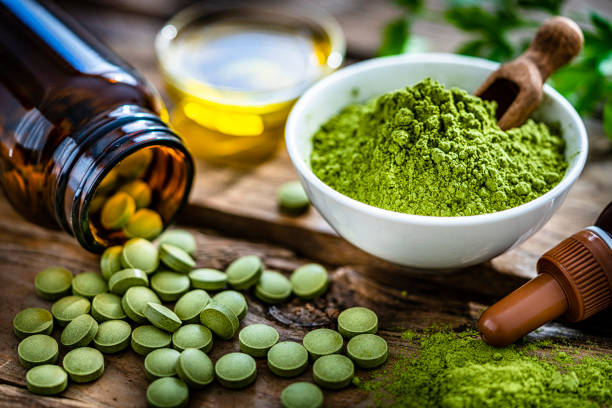
History and Origins of Moringa Powder
The history and origins of Moringa powder trace back centuries, rooted in the regions of South Asia, particularly India and Nepal, where the Moringa oleifera tree naturally grows. This tree, often referred to as the “drumstick tree” or the “miracle tree,” has been an integral part of traditional medicine and local diets in these regions for thousands of years.
Historical records indicate that various cultures, including ancient Indian Ayurvedic medicine and traditional African medicine, recognized the numerous health benefits of the Moringa tree. Its leaves, pods, seeds, and flowers were used for medicinal purposes and as a dietary supplement to address ailments and provide essential nutrients.
The use of Moringa leaves in various forms, including as a powder, dates back to ancient civilizations, where it was esteemed for its nutritional richness and therapeutic properties. Over time, the knowledge of its benefits spread across different cultures and regions, leading to its cultivation in various parts of Asia, Africa, and eventually other parts of the world.
In recent decades, as interest in natural remedies and superfoods has surged, Moringa has gained global attention. Its leaves are harvested, dried, and ground into a fine powder, preserving its nutritional potency. This powder has become a popular dietary supplement and health food due to its exceptional nutrient content, including high levels of vitamins, minerals, antioxidants, and essential amino acids.
Today, the production and consumption of Moringa powder have expanded worldwide, with increased awareness of its potential health benefits driving its popularity. Its historical roots in traditional medicine continue to merge with modern research, further uncovering the remarkable nutritional and medicinal properties of this “miracle tree.” As such, Moringa powder continues to be embraced by health-conscious individuals seeking natural and nutrient-rich supplements to enhance their well-being
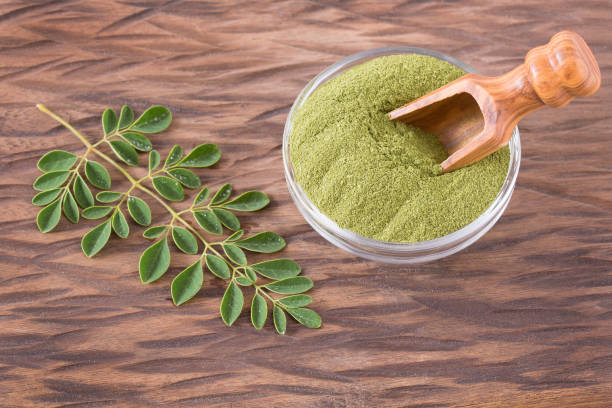
Nutritional Benefits of Moringa Powder
Moringa powder is a nutritional powerhouse, offering an impressive array of health benefits due to its rich composition of essential nutrients. Here’s a breakdown of its nutritional benefits:
- Vitamins: Moringa powder is packed with vitamins, including vitamin A, vitamin C, vitamin E, and several B vitamins like B6 and riboflavin. These vitamins play vital roles in supporting immune function, skin health, vision, and overall vitality.
- Minerals: It contains an abundance of essential minerals such as calcium, potassium, iron, magnesium, and phosphorus. These minerals are crucial for bone health, muscle function, energy production, and maintaining electrolyte balance in the body.
- Antioxidants: Moringa powder is rich in antioxidants like quercetin, chlorogenic acid, and beta-carotene. Antioxidants help combat oxidative stress, reduce inflammation, and protect cells from damage caused by free radicals, thereby supporting overall health and potentially reducing the risk of chronic diseases.
- Proteins and Amino Acids: It’s a source of complete protein containing all nine essential amino acids, making it valuable for individuals following vegetarian or vegan diets. Amino acids are the building blocks of proteins and play crucial roles in various bodily functions, including muscle repair, hormone production, and immune function.
- Fiber: Moringa powder is a good source of dietary fiber, which aids in digestion, promotes gut health, and helps regulate bowel movements.
- Phytonutrients: It contains a variety of phytonutrients, bioactive compounds found in plants, which have potential health benefits such as anti-inflammatory, antibacterial, and antifungal properties.
These combined nutritional components make Moringa powder a superfood, contributing to overall health and well-being. Regular consumption of Moringa powder as part of a balanced diet may help boost immunity, support heart health, improve skin and hair condition, aid in managing blood sugar levels, and provide an energy boost. However, it’s essential to incorporate it sensibly into one’s diet and consult a healthcare professional before making significant dietary changes, especially for those with specific health conditions or allergies.
How to Use Moringa Powder
1. Mixing in Beverages
Add a teaspoon of Moringa powder to your morning smoothie or freshly squeezed juice. Its mild flavor blends well with fruits and vegetables, enhancing the nutritional value of your drink.
2. Cooking Enhancement
Sprinkle Moringa powder over salads, soups, or cooked dishes just before serving. It can subtly enrich the taste while providing an extra boost of nutrients.
3. Baking Boost
Incorporate Moringa powder into baked goods like muffins, cookies, or bread recipes. This allows you to enjoy its benefits in tasty treats.
4. Tea Infusion
Make Moringa tea by steeping the powder in hot water for a few minutes. Add honey or lemon for flavor if desired. This method retains most of its nutritional content.
5. Salad Dressing
Mix Moringa powder into homemade salad dressings or vinaigrettes for an added nutritional punch to your salads.
6. Face Masks or Skincare
Combine Moringa powder with natural ingredients like honey or yogurt to create facial masks. Its antioxidants can promote healthy skin.
7. Hair Masks
Mix Moringa powder with coconut oil or aloe vera gel to create a hair mask. Apply to your scalp and hair for potential benefits to hair health.
Remember, moderation is key. Start with small amounts and gradually increase as you become accustomed to it. Enjoy experimenting with different ways to incorporate this nutritious powder into your routine!
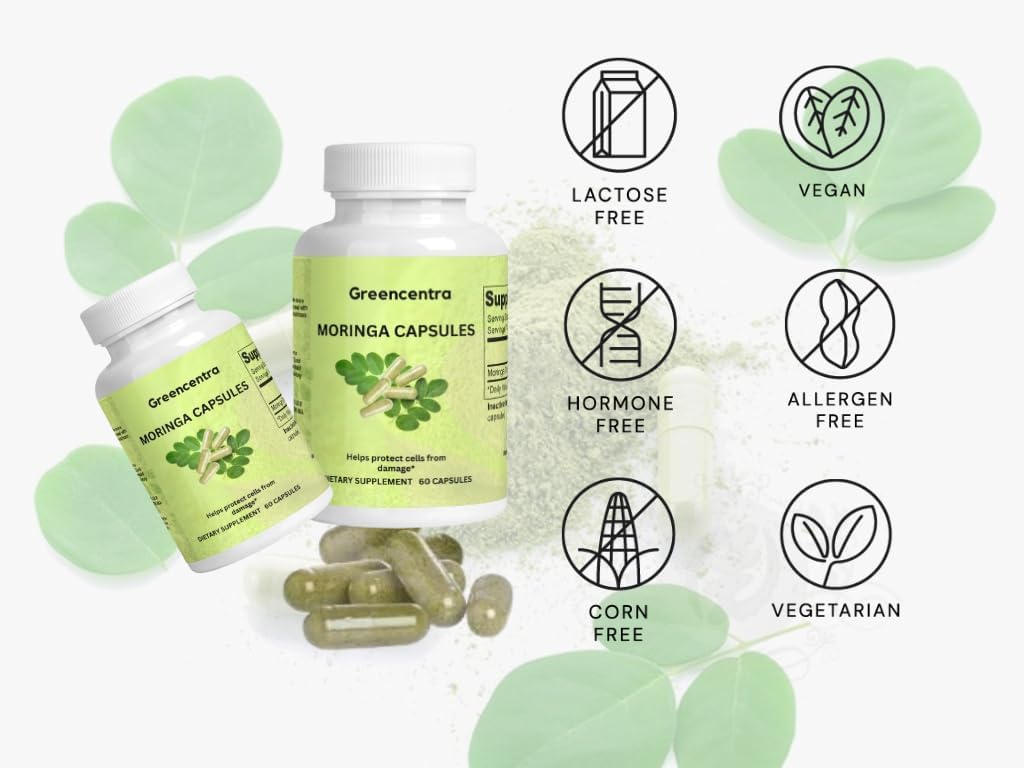
Recommended Dosages and Precautions
Recommended Dosages:
- Starting Dosage: Begin with ½ to 1 teaspoon of Moringa powder per day.
- Gradual Increase: Slowly increase the dosage over a few weeks to assess your body’s response.
- General Maintenance: For most adults, a daily dosage of 1 to 2 teaspoons is often sufficient.
Precautions:
- Consult a Healthcare Professional: Especially if you have underlying health conditions or are pregnant/nursing.
- Potential Interactions: Moringa may interact with certain medications. Consult your doctor if you take medications regularly.
- Allergies: Individuals allergic to other plants (such as cashews or latex) might have a sensitivity to Moringa. Be cautious if you have known allergies.
- Moderation: Excessive intake of Moringa powder may lead to digestive discomfort. Adhere to recommended dosages.
- Quality and Source: Ensure you purchase Moringa powder from reputable sources to guarantee purity and quality.
Additional Considerations:
- Children: Dosage for children should be significantly lower and supervised by a healthcare professional.
- Storage: Store Moringa powder in an airtight container away from direct sunlight and moisture to preserve its potency.
By following these recommendations and being aware of potential precautions, you can incorporate Moringa powder into your routine safely and effectively to enjoy its potential health benefits. Always prioritize moderation and seek professional advice when in doubt.
Research and Studies on Moringa Powder
Nutritional Content:
- Rich in Nutrients: Studies highlight Moringa powder as a potent source of essential nutrients like vitamins (A, C, E), minerals (calcium, potassium, iron), and amino acids, making it a valuable addition to diets deficient in these nutrients.
Antioxidant and Anti-inflammatory Properties:
- Antioxidant Potential: Research shows that compounds in Moringa, such as flavonoids, polyphenols, and carotenoids, exhibit strong antioxidant activity, combating oxidative stress and reducing cell damage caused by free radicals.
- Anti-inflammatory Effects: Certain components in Moringa possess anti-inflammatory properties, potentially aiding in managing inflammatory conditions.
Health Benefits:
- Immune Support: Studies suggest that Moringa’s high antioxidant content may enhance immune function, potentially protecting against infections and bolstering overall immunity.
- Blood Sugar Regulation: Some research indicates that Moringa may help regulate blood sugar levels, potentially beneficial for individuals with diabetes or insulin resistance.
- Skin and Hair Health: Preliminary studies suggest that Moringa’s nutritional profile might contribute to healthier skin and hair, though more research is needed to establish its specific effects.
Other Potential Benefits:
- Cardiovascular Health: Early studies hint at Moringa’s positive impact on heart health, including potential cholesterol-lowering effects and improved lipid profiles.
- Anti-microbial Properties: Components in Moringa exhibit antimicrobial properties, showing promise in combating certain bacteria and fungi.
Buying Guide and Tips
1. Source and Quality:
- Organic Certification: Look for Moringa powder labeled as organic, ensuring it’s free from pesticides and chemicals.
- Reputable Brands: Choose products from reputable brands or suppliers known for their quality and transparency in sourcing.
2. Purity and Processing:
- Pure Moringa: Check for 100% pure Moringa powder without fillers or additives.
- Processing Methods: Opt for brands that use gentle processing methods to retain the nutritional value of the powder.
3. Packaging and Storage:
- Airtight Packaging: Ensure the powder is packed in airtight containers to maintain freshness.
- Opaque Packaging: Look for packaging that protects the powder from direct sunlight, preserving its potency.
4. Reviews and Recommendations:
- Customer Feedback: Check reviews and feedback from other buyers to gauge the quality and effectiveness of the product.
- Recommendations: Seek recommendations from trusted sources or individuals who have experience with Moringa powder.
5. Price and Quantity:
- Value for Money: Compare prices while considering the quality and quantity offered by different brands.
- Bulk Options: If you plan to use Moringa powder regularly, buying in bulk may offer cost savings.
6. Sustainability and Ethics:
- Fair Trade Practices: Consider brands that support fair trade and ethical practices in sourcing Moringa.
- Sustainable Sourcing: Look for products that promote sustainable farming and production methods.
7. Expiration Date and Storage Instructions:
- Expiration Date: Check the expiration date to ensure freshness.
- Storage Guidance: Ensure the packaging provides proper storage instructions to maintain the powder’s quality.
Source to Get Organic Moringa Leaf Powder Capsules
Conclusion
In conclusion, Moringa powder stands as a testament to nature’s remarkable offerings, packed with an array of nutrients and health-boosting properties. Embracing Moringa as a dietary supplement holds immense promise in fostering overall health and well-being.
FAQs
1. Is Moringa powder safe for consumption?
Yes, when consumed in recommended doses, Moringa powder is generally considered safe for most individuals.
2. Can Moringa powder replace other supplements?
While it offers various nutrients, it’s advisable to maintain a balanced diet and consult healthcare professionals regarding supplement usage.
3. Are there any side effects of consuming Moringa powder?
In some cases, excessive consumption may lead to digestive issues. Moderation is key for optimal benefits.
4. Is Moringa powder suitable for everyone, including pregnant women?
Pregnant or breastfeeding individuals should consult healthcare providers before incorporating Moringa powder due to its potent nature.
5. How can I incorporate Moringa powder into my daily routine?
You can add it to smoothies, sprinkle it on salads, or mix it into soups and beverages for an easy and nutritious boost.
